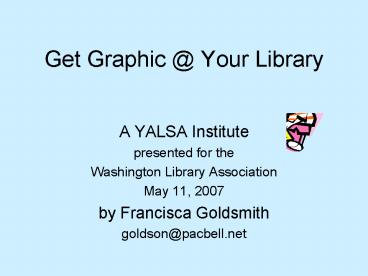Get Graphic Your Library - PowerPoint PPT Presentation
1 / 27
Title:
Get Graphic Your Library
Description:
Funny pages. Comic books. Instructional manuals 'One off' books and finite series ... People of color in comics. Translations. Lunch. Collection Development ... – PowerPoint PPT presentation
Number of Views:47
Avg rating:3.0/5.0
Title: Get Graphic Your Library
1
Get Graphic _at_ Your Library
- A YALSA Institute
- presented for the
- Washington Library Association
- May 11, 2007
- by Francisca Goldsmith
- goldson_at_pacbell.net
2
Agenda
- Introductions
- History
- Genres
- Literacy issues
- Social and political issues
- Collection development
- Cataloging and technical concerns
- Programming
3
History of Graphic Novels (the 7-minute version)
- Narrative images
- Caricature
- Illustrated stories
- Funny pages
- Comic books
- Instructional manuals
- One off books and finite series
4
Graphic Novels in Libraries (a slightly more
detailed history)
- Academic archives
- Browsing collections
- Prisons, teens, and professional discussion
- The teen focus in public and school libraries
- Broadening views and more available tools
5
Graphic Novel Vocabulary
- Panel
- Image
- Balloon
- Bubble
- Gutter
- Flow
- Story
- Sequential art
- Penciler
- Inker
- Artist
- Manga
- Shoji
- Shojen
- Independents
- Superheroes
6
Exercise 1Were you a comics reading kid? What
were you reading?
7
Readers Advisory Genres
8
Break
9
Literacy
- Myths
- Realities
- Changes over time
10
Teen Literacy Concerns
- Ability to decode text
- Capacity to grasp/enjoy narrative behind the code
- Requirements of non-native language
- Availability of time to read
11
Myths about Graphic Novels and Literacy
- Reading comics is easier than reading plain text.
- Comics are a natural for readers new to the
dominant language. - Graphic novels most appropriate audience is
youth.
12
(No Transcript)
13
Exercise 2Rewriting/Redrawing the Comics
14
Literacy Facts
- Reading comics proficiently requires both
linguistic and visual literacies. - Comics often include rich and sophisticated
written language. - Images are not always culturally universal and
can be offensive. - There are comics more appropriate and less
appropriate to every audience type.
15
Literacy Is a Changing Concept
- Its more than decoding text.
- Youth reference mixed media with literacy skills
and energy. - Information acquisition and the enjoyment of
story arent coterminus in the skills they demand.
16
Other Social and Political Issues
- Women as they appear in comics
- People of color in comics
- Translations
17
Lunch
18
Collection Development
- Core lists
- Reviews of new material
- Vendors
- Communities can help
- Collection policies
19
Exercise 3Reading and Writing Reviews
20
Booktalking That Fits the Audience
21
Break
22
Cataloging Update
- Changes in Library of Congress prescriptions
- Alternative best practices
23
Handling the Goods
- Processing issues
- Shelving concerns
- Repairing and replacing
24
Programs Give Your Collection Legs
- Comic book swaps
- Trivia (and not so trivial) contests
- Graphic novel discussion groups
- Comic book production workshops
- Comics/graphic novels on film
- Superhero designing
25
Exercise 4Program Proposal
26
Program for Library Staff
- Adolescent development
- Adolescent social problems
- Pop culture
- Runaways/Re-Gifters/New Adventures of Abraham
Lincoln - Tale of One Bad Rat/The Amazing True Story of a
of a Teenage Single Mom/Pedro and Me - Para Para Para/Black Panther/Tough Love
27
Wrapping Up
- Questions
- Evaluation































